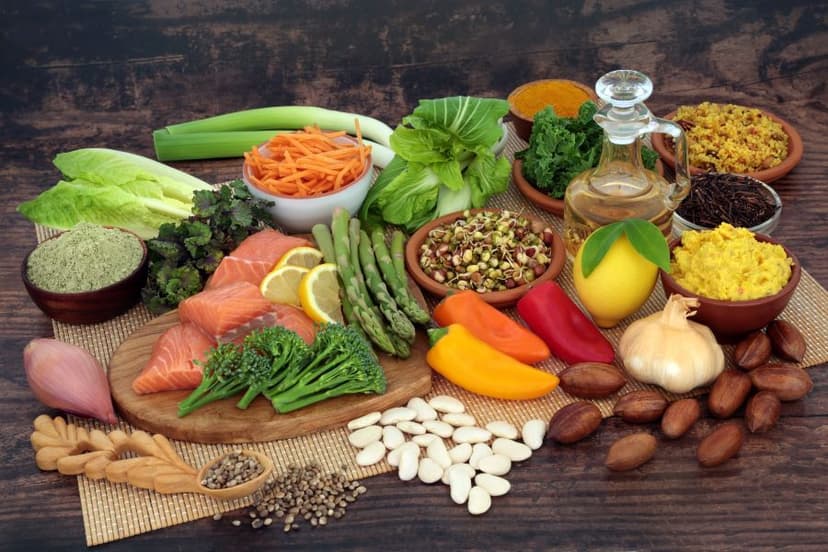Using Food and Natural Remedies to Manage Senior Arthritis Pain
Dorothy Wilson • June 27, 2024 • 5 min
Arthritis affects many seniors in the US, causing discomfort and limiting daily activities. Managing arthritis through proper nutrition and home remedies can significantly alleviate symptoms and improve quality of life. This guide explores effective dietary strategies and natural treatments, highlighting anti-inflammatory foods, herbal supplements, and practical remedies to help seniors manage arthritis pain and maintain joint health.

Food's Power to Manage Arthritis
An important factor in controlling arthritic symptoms is diet. Certain foods are vital to an arthritis-friendly diet because they can help lower inflammation and joint discomfort.
Inflammatory-Free Foods
By include items that reduce inflammation in your diet, you can significantly reduce the symptoms of arthritis. Fish high in omega-3 fatty acids, such as mackerel and salmon, are well known for their powerful anti-inflammatory effects. By lowering the body's inflammatory chemical production, these fatty acids aid in the reduction of joint stiffness and discomfort. Furthermore, walnuts and flaxseeds are great providers of omega-3 fatty acids and are readily included into smoothies or salads.
An additional potent inflammatory-reducing dietary category consists of antioxidant-rich fruits and vegetables. Strawberries and blueberries are two berries that are rich in antioxidants that reduce inflammation. Due to their high vitamin and mineral content, leafy greens like kale and spinach are especially advantageous for joint health. It is possible to establish a healthy, well-balanced diet that helps manage arthritis pain by consuming a range of these items.
Foods to Steer Clear of
Certain meals can help reduce the symptoms of arthritis, while other foods might make them worse. Processed meals can exacerbate arthritis pain and inflammation since they are heavy in harmful fats and processed sugars. Sugary snacks, drink, and fast meals are common offenders. Cutting less on these meals can greatly enhance general health and lessen joint discomfort.
In certain people, nightshade foods including tomatoes, peppers, and eggplants can also cause flare-ups of arthritis. Even if these veggies don't bother everyone, if you eat them frequently, it's important to be aware of their possible effects and keep an eye on your symptoms. You may enhance your everyday functioning and more effectively manage your arthritis pain by recognizing and avoiding trigger foods.
Natural Remedies for Arthritis Relief
Natural remedies offer alternative approaches to managing arthritis pain without relying solely on medications. These remedies can complement dietary changes and provide additional relief.
Herbal Supplements
Several herbal supplements have shown promise in reducing arthritis pain and inflammation. Turmeric, a spice commonly used in Indian cuisine, contains curcumin, which has powerful anti-inflammatory properties. Taking turmeric supplements or incorporating it into your diet can help reduce joint pain and stiffness. Similarly, ginger has anti-inflammatory effects and can be consumed as a tea or added to meals for its health benefits.
Boswellia, also known as Indian frankincense, is another herb that has been used for centuries to treat inflammatory conditions. Studies have shown that boswellia can reduce joint pain and improve mobility in individuals with arthritis. Taking boswellia supplements or using it in essential oil form for massage can provide relief from arthritis symptoms.
Topical Treatments
Topical treatments can offer immediate pain relief for seniors suffering from arthritis. Capsaicin cream, derived from chili peppers, is a popular choice for its ability to reduce pain by blocking pain signals to the brain. Applying capsaicin cream to affected joints can provide temporary relief and improve mobility.
Another effective topical treatment is menthol, commonly found in over-the-counter pain relief creams. Menthol creates a cooling sensation that can soothe sore joints and reduce pain. Using these topical treatments regularly can help manage arthritis pain and enhance daily comfort.
Diet for Arthritis Pain Relief
Adopting a diet tailored for arthritis can significantly reduce pain and improve joint health. Here are some key dietary considerations for seniors managing arthritis.
Balanced Meals
A balanced diet that includes a variety of nutrient-dense foods is essential for overall health and arthritis management. Incorporating lean proteins, whole grains, and plenty of fruits and vegetables can provide the necessary nutrients to support joint health. Protein sources such as chicken, turkey, and legumes are important for maintaining muscle mass and supporting joint function.
Whole grains like quinoa, brown rice, and oats are rich in fiber and help reduce inflammation. They also provide sustained energy levels, which is important for staying active and maintaining a healthy weight. Including a range of colorful fruits and vegetables ensures you get a variety of vitamins, minerals, and antioxidants that promote joint health and reduce inflammation.
Hydration and Bone Health
Staying hydrated is crucial for joint health, as water helps maintain the lubrication of joints and cartilage. Drinking plenty of water throughout the day can help keep joints flexible and reduce stiffness. Additionally, consuming foods high in calcium and vitamin D is important for maintaining strong bones and reducing the risk of osteoporosis, which can exacerbate arthritis symptoms.
Dairy products like milk, cheese, and yogurt are excellent sources of calcium. For those who are lactose intolerant, fortified plant-based milk alternatives like almond or soy milk can provide similar benefits. Foods rich in vitamin D, such as fatty fish and fortified cereals, are also essential for bone health and can help manage arthritis symptoms.

Natural Remedies for Arthritis Pain
When treating arthritic pain, natural remedies offer an alternative to prescription drugs. Besides dietary changes, these therapies can provide further alleviation.
Herb-Based Supplements
Numerous herbal remedies have shown promise in reducing arthritis-related inflammation and pain. Turmeric contains the spice curcumin, which is widely used in Indian food and has strong anti-inflammatory properties. Adding turmeric to your diet or taking supplements may help reduce joint stiffness and soreness. Similarly, ginger may be added to meals or drank as a tea to provide health advantages due to its anti-inflammatory qualities.
Another plant, boswellia, often known as Indian frankincense, has been used for millennia to treat inflammatory illnesses. Studies show that boswellia reduces joint pain and improves range of motion in individuals with arthritis. Arthritis symptoms can be reduced with the use of essential oils in massage or boswellia tablets.
Interventions on Topics
Topical therapy can provide seniors with arthritis with immediate pain relief. Capsaicin cream, derived from chili peppers, is a well-liked pain reliever because it may block pain signals from going to the brain. Applying capsaicin lotion to injured joints may improve range of motion and provide brief relief.
Another effective topical treatment is menthol, which is widely found in over-the-counter pain relief creams. Menthol provides a cooling sensation that relieves sore joints and stiffness. Frequent use of these topical treatments can enhance daily comfort and help manage arthritis pain.
Diet to Lessen Pain from Arthritis
An arthritis-specific diet can improve joint health and significantly reduce suffering. These are some crucial dietary recommendations for senior arthritis sufferers.
Harmonious Dinners
A diet high in nutrients and well-balanced in foods is essential for both the treatment of arthritis and the preservation of overall health. A diet rich in fruits, vegetables, whole grains, and lean meats can provide the nutrients needed to keep joints healthy. Legumes, poultry, and other high-protein foods are excellent for preserving muscle mass and bolstering joint health.
Whole grains high in fiber that can reduce inflammation include quinoa, brown rice, and oats. They also provide you sustained energy, which is important to maintain your weight and keep you going. Eating a variety of colorful fruits and vegetables will provide you with a range of vitamins, minerals, and antioxidants that promote joint health and reduce inflammation.
Bone health and hydration
Due to the fact that water keeps joints and cartilage lubricated, maintaining proper hydration is essential for joint health. Water consumption throughout the day might assist maintain joint flexibility and lessen stiffness. Eating foods high in calcium and vitamin D also helps to maintain strong bones and avoid osteoporosis, which can exacerbate arthritic symptoms.
Dairy products are a great source of calcium, including cheese, yogurt, and milk. For those who are lactose intolerant, fortified plant-based milk alternatives like almond or soy milk can provide similar benefits. In addition to being vital for bone health, foods high in vitamin D, such fatty fish and fortified cereals, can help control the symptoms of arthritis.
Disclaimer: This article is for informational purposes only and does not constitute medical advice. Consult with a healthcare provider for advice tailored to your personal circumstances.